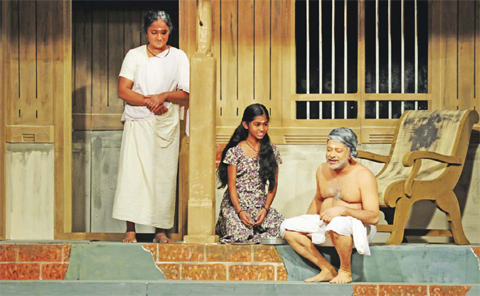Theatre of the 1950s revisited
 Still from the play ‘Ningalenne Communistakki’.
Still from the play ‘Ningalenne Communistakki’.
KALPAK Kuwait, a well-known theatre troupe of the expat community, staged 'Ningalenne Communistakki' in Kuwait, a blockbuster Malayalam drama of the 1950s that transformed Kerala's social arena. By staging the three-and-half-hour play three times on a single day in Kuwait, KALPAK has not only created a milestone for the troupe, but took many theatre-lovers for a ride down memory lane.
"It is easier said than done. 'Ningalenne Communistakki' (You Made Me A Communist), was probably the most challenging theatrical initiative we have ever undertaken over the last two decades of our theatre life in Kuwait," said Babu Chakola, the director and the moving force behind the theatre group. KALPAK has produced scores of plays including dramas based on the Bible and the Mahabharata in addition to social plays.
"It was like the famous saying, 'fools rush in where angels fear to tread.' The play itself presented enormous challenges for us," Chakola said elaborating the risks involved in producing the drama which was staged more than 5,000 times across India in 1950s.
The Malayalam play, written and directed by late theatre thespian Thoppil Bhasi, transformed the state's political and social domains with its iconoclastic subject and presentation. "No mention of Malayalam theatre can be complete without referring to late Thoppil Bhasi and his brainchild Kerala People's Arts Club (KPAC). The history of KPAC is a part of the socio-political and cultural history of Kerala," said Chakola.
'Ningalenne Communistakki' was the second and most popular stage play of KPAC that propelled the troupe into the forefront of Kerala cultural scene and played a historical role in popularizing the communist movement in the state during 1950s eventually leading to the establishment of the first democratically elected communist ministry in the world in 1957 in Kerala under E M S Namboodiripad.
"Primarily, we had to meet the expectations of a drama that has created history in India. Secondly, we had to recreate an era of 1950s, its social and political milieu. So in every aspect of the play, from the script and characterization to dialogue and dialect, stage setting and costume, we had to take utmost care to do a semblance of justice to a play of that stature," he explained.
Challenges
"Interestingly, many of my friends including fellow theatre people warned me about the possible risks and challenges involved in producing it. But we decided to pick up the gauntlet, come what may," Chakola said.
Chakola, the well-known stage designer Sujathaan Master and Kumar Trithala visited late Thoppil Bhasi's residence in Kerala and received the script from his wife Ammini Amma. Daunting at first, KALPAK went ahead with the project in right earnest. The rehearsals started off with a 4-month production schedule. KALPAK faced its greatest test when the Indian embassy cancelled the booking of the auditorium just two days prior to the staging. Regaining composure from the shock, Chakola recouped and looked frenetically for an alternative venue. "We managed to find a venue at Boys' Scouts' Auditorium in Hawally at last and staged the play within seven days of its original schedule," he said.
Well-received by the theatre enthusiasts in Kuwait, the play managed to successfully recapture the essence of the fifties. Many theatre-buffs could even feel that they could revisit the vibrant theatre experience of the 1950s. With very convincing performances, the stellar actors of KALPAK recreated those characters of the past such as Pappu, Paramu Pillai and Paramu Pillai who are forever etched in the memories of theatre lovers in Kerala. The cast includes an array of actors like Babu Chakola, Kumar Trithala, John Kozhenchery, Pradeep Vengola, Shajahan Kodungalloor, Aji Paravoor, Chandran Puthur, Dennis Tharakan, Sasi Kozhenjery, Bimalkumar, Shashankan, K r Rajan, Manu Mathew, Deena Deennis Tharakan, Sheeja Davis Tharakan, Kumari Alvia Shiju, Master Ivin Shiju and Pranav Shivakumar.
The directorial brilliance of Chakola shone through the play. Well-known stage designer Sujathan Master expertly recreated the backdrops for the drama transporting the audience back to the Kerala of the fifties. While Chirackal Raju did the lighting for the play, Varghese Paul provided the sound and Siby arranged the lights. Others who worked off stage included Sasi Kozhenchery (Assistant direction), Manoj Mavelikkara (background music), Idikkula Mathew (program convener), Reji Mathew (PRO) Ajayan (technical support), Sajeesh Vayanad (stage setting), Anil Sopanam (makeup).
As a committed theatre activist and the winner of Kalashri award instituted by Kerala Sangeetha Nataka Akademi, Chakola is already in the workshop of his new drama. "Theatre is inextricably linked with human life and my life is linked with theatre," Chakola quipped.
By Sajeev K Peter




